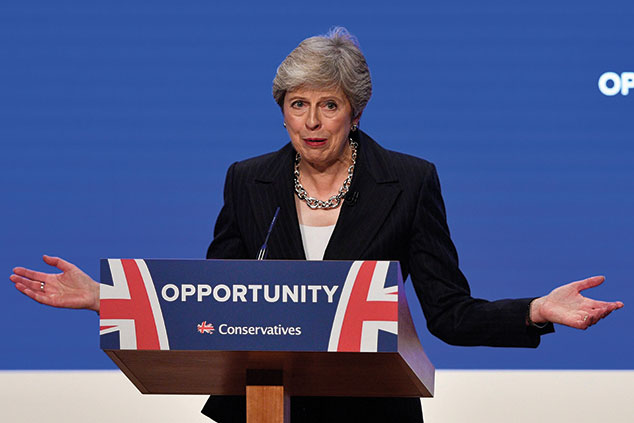
“The age-old cliches about the Tories come easy: the ‘natural party of government’; an ‘appetite for power’; a ‘ruthless talent for reinvention’”, says Robert Shrimsley in the Financial Times. None of those terms seemed appropriate as the Conservative Party gathered for its annual conference in Birmingham this week. Instead, its MPs are “fighting like a natural party of opposition”, even though many of them are all too aware of the existential threat that the party faces while it remains “convulsed by the European neurosis that has destroyed their past four prime ministers”.
Take Philip Hammond’s speech on Monday, says Aditya Chakrabortty in The Guardian. Humming through the chancellor’s lines about “solutions based on realism not populism” was anxiety about the threat posed by Jeremy Corbyn. He and his colleagues know that Labour’s arguments about “Britain’s broken economy” are hitting home. Polls suggest that more than half of Britons believe that life in the UK is getting worse. Less than a third think the government has a clear plan to turn this around. “The Tories sense this widespread pessimism – they just haven’t a clue what to do about it”.
Johnson whips up the faithful
Many of the grass roots think that a change of leader is what’s needed – hence the rapturous reception for Boris Johnson on Tuesday, who brought some “much-needed vigour” to an otherwise lacklustre conference, says the Daily Telegraph. Johnson urged Theresa May to pursue a harder Brexit, while also arguing for a bold domestic agenda based around tax cuts and increased housebuilding.
Leaving aside the question of whether Johnson is plotting a leadership bid, the speech shows that the party needs him in a front-line role at the very least. “No one else comes close to articulating the essence of conservatism in a way that reaches beyond the party’s traditional heartlands”.
Yet the reality is that the Tories have alienated vast swathes of the electorate, says Rachel Sylvester in The Times. Only 15% of under-25s think the party represents people like them. Ethnic minorities are increasingly hostile, while the share of young women who support Labour rose from 28% in 2010 to 73% last year. Support among its middle-class base is also being eroded.
Meanwhile, Brexit has become a proxy for other views about the modern world, such as gay marriage, immigration and the environment, say Tory strategists. A leader with a hard Brexit stance would be even more divisive at a time when “the Tories urgently need to regain the trust of a wider range of voters”.
Not that the current incumbent of Number 10 shows much ability to do that. Before the conference, May spoke of spending £120m on a festival of “national renewal” in 2022 to mark Britain’s departure from the EU – a proposal that was “immediately, mercilessly mocked”, says Dan Bloom in the Daily Mirror.
Her closing speech on Wednesday was the “beneficiary of low expectations”, says George Eaton in the New Statesman: at least there was no prankster to hand her a P45, as happened last year. She tried to take on Corbyn by adopting Labour’s proposal that councils should be able to borrow more to build houses and also proclaimed an easing of austerity. Yet her rhetoric “was undermined by her record”: after the past two years, she cannot paint herself as a “unifying figure”.
Yes, May has probably seen off a leadership challenge for now, but that will not be enough. “Faced with the epic task of Brexit, and burdened by a discredited prime minister, the Tories cannot achieve the political and intellectual renewal they so visibly need”.